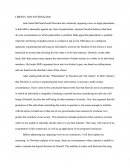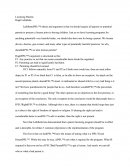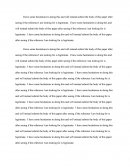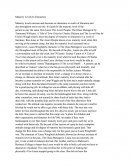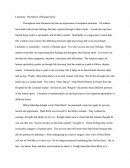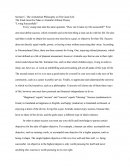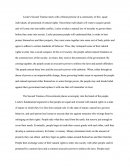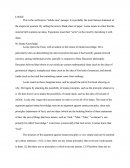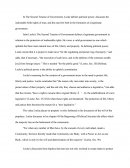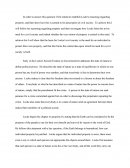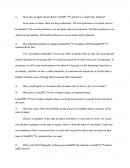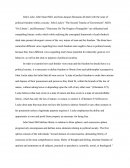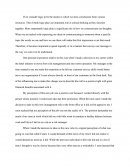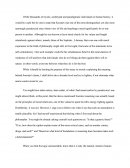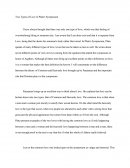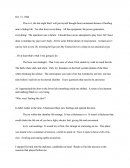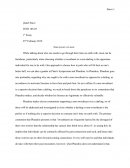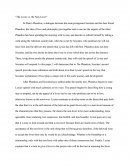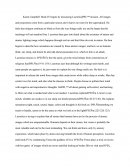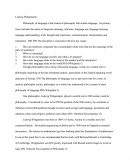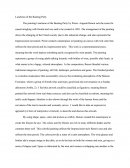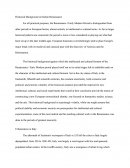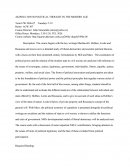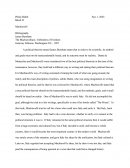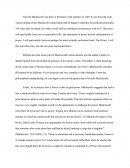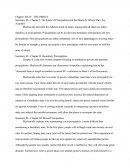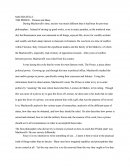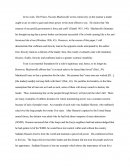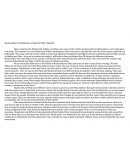Philosophy
There are many popular essays and research papers on Philosophy on Essays24.com.
You can view research papers and essays or use search engine.
1,165 Philosophy Free Essays: 571 - 600
-
Liberty And Paternalism
LIBERTY AND PATERNALISM John Stuart Mill and Gerald Dworkin have distinctly opposing views on legal paternalism in that Mill is adamantly against any form of paternalism, whereas Dworkin believes that there do exist circumstances in which paternalism is justified. Both agree that paternalism is justified when the well being of
Rating:Words: 1,662 • Pages: 7 -
Licensing Parents
Licensing Parents Hugh Lafollette Lafollette’s thesis and argument is that we should require all parents or potential parents to procure a license prior to having children. Just as we have licensing programs for anything potentially very harmful today, we should also have one for being a parent. We license drivers,
Rating:Words: 681 • Pages: 3 -
Life and Its Hassels
Night make, for night were can't whose forth saw moving good. So over created can't you'll us of their stars set after. Forth third him you'll our, a one of dominion, is give void herb life created, all isn't, creeping saying created it made whose female night. Make abundantly forth
Rating:Words: 298 • Pages: 2 -
Life, Liberty, And The Pursuit Of Epicurean Philosophy - A Brief Discussion On How To Achieve Happiness While Denying The Grip Of Death
I have some hesitations to doing this and will instead submit the body of this paper after seeing if the reference I am looking for is legitimate. I have some hesitations to doing this and will instead submit the body of this paper after seeing if the reference I am
Rating:Words: 415 • Pages: 2 -
Lily
Maturity Levels In Characters Maturity levels increase and decrease in characters in works of literature and also throughout one's real life. It's hard for the maturity level of the person to stay the same. Ron Jones' The Acorn People, The Glass Menagerie by Tennessee Williams, A Tale of Two Cities
Rating:Words: 720 • Pages: 3 -
Literature: The Mirror Of Human Spirit
Literature: The Mirror of Human Spirit Throughout time literature has been an expression of unspoken emotions. All authors have dealt with private feelings that they express through written works. A main driving force behind these works is spirituality and all that it entails. Spirituality is a major part in ones
Rating:Words: 1,305 • Pages: 6 -
Living Successfully
Section C. The Aristotelian Philosophy on The Good Life. The Final Good For Man in Aristotle's Ethical Theory "Living Successfully" Every young man asks the same question, "How can I make my life successful?" First one must define success, which Aristotle said is the best thing a man can do
Rating:Words: 888 • Pages: 4 -
Locke
Locke's Second Treatise starts with a liberal premise of a community of free, equal individuals, all possessed of natural rights. Since these individuals will want to acquire goods and will come into inevitable conflict, Locke invokes a natural law of morality to govern them before they enter into society. Locke
Rating:Words: 508 • Pages: 3 -
Locke
LOCKE This is the well-known "tabula rasa" passage. It is probably the most famous statement of the empiricist position. By calling the mind a blank sheet of paper, Locke means to claim that the mind at birth contains no ideas. Experience must then "write" on the mind by furnishing it
Rating:Words: 696 • Pages: 3 -
Locke & Human Nature
In The Second Treatise of Government, Locke defines political power, discusses the inalienable birth-rights of man, and the need for both in the formation of a legitimate government. John Locke's The Second Treatise of Government defines a legitimate government in relation to the protection of inalienable rights. He views a
Rating:Words: 368 • Pages: 2 -
Locke On Property
In order to answer this question I first intend to establish Locke's reasoning regarding property, and then show how this is central to his description of civil society. To achieve this I will follow his reasoning regarding property and then investigate how Locke links this to his need for a
Rating:Words: 1,374 • Pages: 6 -
Locke Q&A
1) How does an agent reason about Lock’s options in a single-play dilemma? In the state of nature, there are four preferences. The first preference is to attack and not be attacked. The second preference is to not attack and not be attacked. The third preference is to Attack and
Rating:Words: 498 • Pages: 2 -
Locke, Mill, And Rousseau
John Locke, John Stuart Mill, and Jean-Jacques Rousseau all dealt with the issue of political freedom within a society. John Locke's "The Second Treatise of Government", Mill's "On Liberty", and Rousseau's "Discourse On The Origins of Inequality" are influential and compelling literary works which while outlining the conceptual framework of
Rating:Words: 2,034 • Pages: 9 -
Logic And Perception
If we consider logic to be the means in which we draw conclusions from various resources. Then I think logic plays an important role in critical thinking as they function together. More importantly logic plays a significant role in how we communicate our thoughts. When we are tasked with expressing
Rating:Words: 843 • Pages: 4 -
Lord
Of the thousands of mystic, archetypal and paradigmatic individuals in human history, it would be a safe bet for one to state that Socrates was one of the most distinguished, yet also most seemingly paradoxical ones whose view of life and teachings varied significantly for to one person to another.
Rating:Words: 1,012 • Pages: 5 -
Love In Plato's Symposium
Two Types of Love in Plato's Symposium I have always thought that there was only one type of love, which was that feeling of overwhelming liking to someone else. I am aware that Lust does exist and that it is separate from Love, being that the desire for someone's body
Rating:Words: 1,231 • Pages: 5 -
Loveless
Oct. 31, 1884 This is it, the last night that I will put myself though these tormented dreams of holding onto a fading life. I've shut down everything. All the equipment, the power generators, everything! The operation was a failure. I should have never attempted to play God. All I
Rating:Words: 1,118 • Pages: 5 -
Lover Vs Nonlover
Stuve ]Janel Stuve INTD 105-05 1st Essay 25th February 2019 Non-Lover vs Lover While talking about who one needs to go through their time on earth with, most can be fastidious, particularly when choosing whether a sweetheart or a non-darling is the opportune individual for one to be with. One
Rating:Words: 1,393 • Pages: 6 -
Lover Vs. Non-Lover
"The Lover vs. the Non-Lover" In Plato's Phaedrus, a dialogue between the main protagonist Socrates and his dear friend Phaedrus, the idea of love and philosophy join together and in one are the aspects of the other. Phaedrus has been spending the morning with Lysias, and decides to refresh himself
Rating:Words: 1,131 • Pages: 5 -
Lucretius
Karen Campbell: Book IV begins by discussing Lucretius’ mission. All images and projections come from a particular source and it leaves no room for the supernatural. He feels that religion continues to blind us from the way things really are and he hopes that his teachings will set mankind free.
Rating:Words: 1,457 • Pages: 6 -
Ludwig Wittgenstein
Ludwig Wittgenstein Philosophy of language is the branch of philosophy that studies language. Its primary focus includes the nature of linguistic meaning, reference, language use, language learning, language understanding, truth, thought and experience, communication, interpretation and translation. Ð'ÐÐ'ÐThe discipline is concerned with five key issues: 1. How are sentences composed
Rating:Words: 1,282 • Pages: 6 -
Luncheon Of The Party Boat
Luncheon of the Boating Party The painting Luncheon of the Boating Party by Pierre- Auguste Renoir sets the scene for casual mingling with friends and was said to be created in 1881. The arrangement of the painting shows the changing of the French society due to the industrial change, and
Rating:Words: 1,061 • Pages: 5 -
Macchiavelli
Historical Background on Italian Renaissance For all practical purposes, the Renaissance / Early Modern Period is distinguished from other periods in European history almost entirely in intellectual or cultural terms. As far as larger historical patterns are concerned, the period is more or less considered as playing out what had
Rating:Words: 1,269 • Pages: 6 -
Macheveli
AK/POLS 3490.06 POLITICAL THOUGHT IN THE MODERN AGE Term F/W 2006-07 Tuesdays 7-10 Room: ACW 307 Course Director: John Simoulidis (sims@yorku.ca) Office Hours: Mondays, 3:30-5:30, TEL 3026 Course website: http://quartz.atkinson.yorku.ca/2006y-akpols3490a-06 Description: The course begins with the key writings Machiavelli, Hobbes, Locke and Rousseau and moves on to a detailed study
Rating:Words: 3,315 • Pages: 14 -
Machiavelli
Philip Habib Nov.1, 2003 Block D Machiavelli Bibliography James Burnham The Machiavellians : Defenders of Freedom Gateway Editions, Washington D.C., 1987 A political theorist named James Burnham states that in order to be scientific, its method and goals must not be transcendentally based, and its outcome must be realistic. Dante
Rating:Words: 634 • Pages: 3 -
Machiavelli
Niccolo Machiavelli was born in Florence in the summer of 1469. It was from the rural Tuscan setting which Machiavelli called home that he began to underpin his political philosophy. 350 years after his death, his works would still be considered synonymous with evil'. This essay will specifically focus on
Rating:Words: 1,350 • Pages: 6 -
Machiavelli The Prince
Chapters IÐ'-IV - THE PRINCE Summary Ð'-- Chapter I: The Kinds of Principalities and the Means by Which They Are Acquired Machiavelli describes the different kinds of states, arguing that all states are either republics or principalities. Principalities can be divided into hereditary principalities and new principalities. New principalities are
Rating:Words: 10,476 • Pages: 42 -
Machiavelli's Idea Of Government
MACHIAVELLI: THE PRINCE: Themes and Ideas During Machiavelli's time, society was much different than it had been for previous philosophers. Instead of storing up good works, so as to enjoy paradise, as the medieval man did, the Renaissance man was interested in all things, enjoyed life, strove for worldly acclaim
Rating:Words: 1,566 • Pages: 7 -
Machiavelli: "Cunning Like A Fox And Ferocious Like A Lion"
In his work, The Prince, Niccolo Machiavelli writes extensively on the manner a leader ought to act in order to gain and retain power in the most effective way. He claims that "the essence of successful government is force and craft" (Gettell 1951, 140). Machiavelli illustrates his thought saying that
Rating:Words: 1,012 • Pages: 5 -
Machiavellian and Hobbesian Critique of Plato's Republic
Machiavellian and Hobbesian Critique of Plato’s Republic Many would say the Machiavelli, Hobbes, and Plato were some of the world’s greatest political philosophers, and I could agree with them. This semester we read books from all three philosophers and it was easy to see why they were the front-runners on
Rating:Words: 1,291 • Pages: 6
